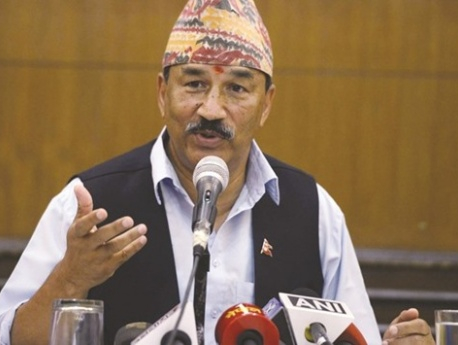
OR
Fuel supply pact with China not likely any time soon
Published On: July 11, 2016 12:01 PM NPT By: Sujan Dhungana
KATHMANDU, July 11: Putting aside plan to sign commercial petroleum supply agreement with China, the government has started a study on the prospects of producing fuel in the country itself.
A five-member government delegation left for China on Sunday to study the possibility of producing fuel using 'coal liquefaction' technology.
According to Wikipedia, coal liquefaction is a process of converting coal into liquid hydrocarbons - liquid fuels and petrochemicals.
Experts, however, say that the technology is not viable in Nepal.
The team led by Supplies Secretary Shreedhar Sapkota left for China on the invitation of China Electronics Engineering Design Institute (CEEDI). Nepal Oil Corporation (NOC) Managing Director Gopal Bahadur Khadka is also in the team.
According to an NOC official, the team will study technologies used to produce fuel using coal and its feasibility in Nepal. The official further said that the team will not touch the issue of petroleum supply agreement.
As Nepal is not a coal producer, the issue is not only controversial but challenging to implement. However, the attempt to bring 'coal liquefaction' technology has hinted that the government has no intention of going into petroleum trading with the northern neighbor anytime soon.
Though it has already been a year since Nepal signed an agreement to procure one-third of its petroleum demand from China, nothing has been done in that direction so far. The issue has been on the backburner immediately after India lifted blockade which immediately eased supply of petroleum products.
The team, which also includes technical experts, will study the technology (of producing fuel from coal) and its viability in Nepal, the official said. “China has proposed to assist us to help produce fuel from coal. If the technology is feasible in Nepal, the two countries will set up coal liquefaction plants along Nepal-China border,” the official added.
Experts say producing fuel from coal will not be feasible in Nepal. “We need 50 trucks of coal to produce one truck of fuel. The technology is not feasible,” a former chief of NOC told Republica.
Former Commerce Secretary Purshottam Ojha also said generating fuel from coal liquefaction technology will not be sustainable. “We cannot generate huge volume of fuel through this technology. Also, the technology is costly and makes negative impact on our environment,” added Ojha.
You May Like This

Trump says Syria attack 'could be very soon or not so soon at all'
WASHINGTON, Aril 12: U.S. President Donald Trump amended on Thursday an earlier warning of a swift military strike against Syria... Read More...

China confirms joint military drill with Nepal for first time
KATHMANDU, Dec 30: Amid concerns of India over the proposed military drill, China on Thursday officially announced that it is holding... Read More...

Nepal's relations with China not at India's cost: DPM Thapa
KATHMANDU, June 11: Nepal's relations with India is "incomparable" and its growing ties with China was not at the cost of... Read More...




Just In
- Health ministry to conduct ‘search and vaccinate’ campaign on May 13
- Indian customs releases trucks carrying Nepali tea, halted across Kakarbhitta
- Silent period for by-election to begin from midnight
- SC issues short-term interim order to govt and TU not to take immediate action against TU legal advisor Khanal
- National consultation workshop advocates to scale up nutrition smart community in Nepal
- Patan High Court issues short-term interim order to halt selection process of NTB’s CEO
- NEPSE inches up 0.15 points; daily turnover increases to Rs 2.53 billion
- Bagmati Govt mandates tri-lingual signboards in offices














Leave A Comment